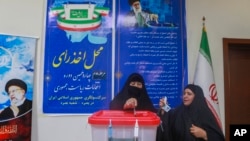Polls in Friday’s presidential runoff election in Iran closed after midnight with early results showing former Health Minister Masoud Pezeshkian with a slight lead, however, witnesses inside the country said most of those eligible did not turn out to vote.
Videos sent to VOA’s Persian Service showed empty voting stations, and numerous eyewitnesses and citizen journalists in Iran reported a low turnout.
The second round of voting to determine the successor to the late President Ebrahim Raisi also coincided with reports of internet outages in some cities, including Tehran, Ahvaz and Rasht.
According to the Telegram channel Eteraz Madani Bazar, the internet was cut off in several cities, including Ahvaz and Rasht, and its speed was severely reduced in others, including the capital, Tehran.
Some social media users speculated that the action was taken to prevent the publication of news and pictures related to empty voting stations.
Iran’s Interior Ministry said initial reports showed the turnout Friday was about 50%, which is higher than the first round of voting in June.
The ministry said early Saturday that Pezeshkian, a relative moderate, had 6.9 million votes, while his ultraconservative opponent, former Iranian nuclear negotiator Saeed Jalili, received more than 6.3 million votes with most of the 25.4 million ballots cast remaining to be counted.
During the first round of voting on June 28, no candidate clinched at least 50% of the vote, although Pezeshkian was slightly ahead of Jalili.
According to the statistics announced by the Islamic Republic, the participation rate in the first round of voting was about 40%. That marked the lowest turnout in Iran since the 1979 Islamic Revolution.
"In spite of the low participation numbers, [Supreme Leader Ayatollah Ali] Khamenei has been relatively successful in creating the illusion of false competition inside the country for an external audience," Kasra Aarabi, of United Against Nuclear Iran, told VOA.
The U.S. says Iran’s elections are not free or fair because its rulers disqualify candidates who are not sufficiently loyal to Khamenei.
Aarabi said there is "no meaningful difference" between Pezeshkian and Jalili "because all strategic policy is determined by Khamenei."
More than 61 million Iranians aged 18 or older were eligible to vote in the presidential election. Voting was to end Friday at 6 p.m. but was extended until midnight to boost participation.
Raisi, who died in a May helicopter crash, had been seen as a potential successor to Khamenei.
Michael Lipin contributed to this report.




